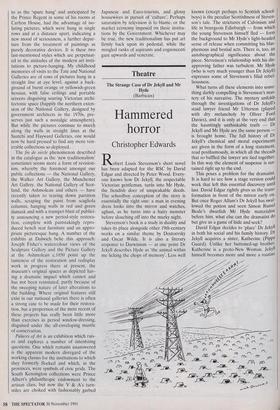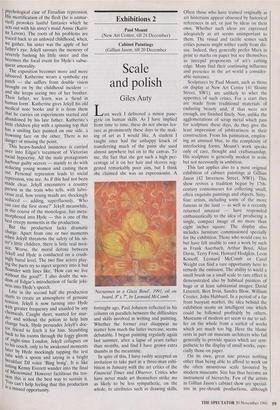Theatre
The Strange Case of Dr Jekyll and Mr
Hyde (Barbican)
Hammered horror
Christopher Edwards
Robert Louis Stevenson's short novel has been adapted for the RSC by David Edgar and directed by Peter Wood. Every- one knows how Dr Jekyll, the respectable Victorian gentleman, turns into Mr Hyde, the fiendish doer of unspeakable deeds. The schoolboy conception of the story is essentially the right one: a man in evening dress looks into the mirror and watches, aghast, as he turns into a hairy monster before slouching off into the murky night.
Stevenson's book is a study in duality and takes its place alongside other 19th-century works on a similar theme by Dostoevsky and Oscar Wilde. It is also a literary response to Darwinism — at one point Dr Jekyll describes Hyde as 'the animal within me licking the chops of memory'. Less well known (except perhaps to Scottish school- boys) is the peculiar Scottishness of Steven- son's tale. The strictures of Calvinism and life in bourgeois Edinburgh — from which the young Stevenson himself fled — form the background to Mr Hyde's light-headed sense of release when committing his blas- phemous and bestial acts. There is, too, an autobiographical significance about the piece. Stevenson's relationship with his dis- approving father was turbulent. Mr Hyde (who is very much younger than Dr Jekyll) expresses some of Stevenson's filial rebel- liousness.
What turns all these elements into some- thing darkly compelling is Stevenson's mas- tery of his narrative. The mystery unfolds through the investigations of Dr Jekyll's staid lawyer friend Mr Utterson (played with dry melancholy by Oliver Ford Davies), and it is only at the very end that the hauntingly unthinkable truth — Dr Jekyll and Mr Hyde are the same person is brought home. The full history of Dr Jekyll's chemical and moral experiments are given in the form of a long statement, read posthumously, in which all the threads that so baffled the lawyer are tied together. In this way the element of suspense is sus- tained right up to the end.
This poses a problem for the dramatist. It is hard to see how a stage version could work that left this essential discovery until last. David Edgar rightly gives us the trans- formation in front of the mirror early on. But once Roger Allam's Dr Jekyll has swal- lowed the potion and seen Simon Russel Beale's dwarfish Mr Hyde materialise before him, what else can the dramatist do but give us a game of hide and seek? David Edgar decides to 'place' Dr Jekyll in both his social and his family history. Dr Jekyll acquires a sister, Katherine (Pippa Guard). Unlike her buttoned-up brother, Katherine is a proto-New Woman. Jekyll himself becomes more and more a routine
Psychological case of Freudian repression. His mortification of the flesh (he is unmar- ried) provokes lustful fantasies which he acts out with his sister's maid Annie (Katri- na Levon). The roots of his problems are traced back to an unloved childhood, when, we gather, his sister was the apple of her father's eye. Jekyll savours the memory of severely bashing his little sister and this becomes the focal event for Hyde's subse- quent amorality. The exposition becomes more and more laboured. Katherine wears a symbolic eye patch — she suffers from double vision brought on by the childhood incident and she keeps seeing two of her brother. Their father, we learn, was a 'fiend in human form'. Katherine gives Jekyll his old medical note books and it is from them that he carries on experiments started and abandoned by his late father. Katherine's little children play with a spinning top that has a smiling face painted on one side, a frowning face on the other. There is no danger of missing the point.
This heavy-handed insistence is carried over into Edgar's treatment of Victorian social hypocrisy. All the male protagonists harbour guilty secrets — mainly to do with seducing young women and casting them out. Personal repression leads to social repression, you see. As if this had not been made clear, Jekyll encounters a country Parson in the train who tells, with lubri- cious zeal, how young maids are shockingly seduced — adding, superfluously, 'Who can cast the first stone?' Jekyll meanwhile, in the course of the monologue, has meta- morphosed into Hyde — this is one of the best creepy moments in the production. But the production lacks dramatic charge. Apart from one or two moments when Jekyll threatens the safety of his sis- ter's little children, there is little real men- ace. Worse, the moral debate between Jekyll and Hyde is conducted on a crush- ingly banal level. The two fine actors play- ing the parts try to inject urgency into it but flounder with lines like, 'How can we live without the good?'. I also doubt the wis- dom of Edgar's introduction of facile joki- ness into Hyde's speech. Late in the second half the production starts to create an atmosphere of genuine tension. Jekyll is now turning into Hyde with greater frequency and unaided by any chemicals. Caught short, wanted for mur- der and without the potion to help him change back, Hyde persuades Jekyll's doc- tor friend to fetch it for him. Stumbling pack to his rooms through the foggy gloom of night-time London, Jekyll collapses on to his couch, only to be awakened moments later by Hyde mockingly tapping the test breakfast with a spoon and saying in a bright Oreakfast DJ voice 'Bing bong'. It is like letting Kenny Everett wander into the final of Mastermind. However factitious the ten- s‘.1cin this is not the best way to sustain it. You can't help feeling that this production is a missed opportunity.











































































 Previous page
Previous page